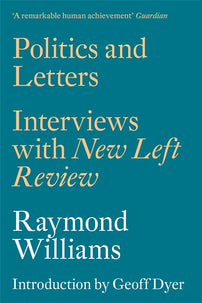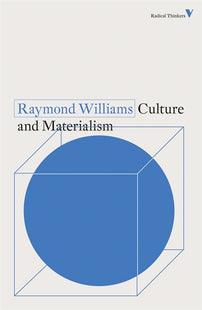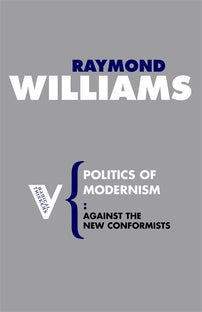Raymond Williams: Socialism, Culture, Revolution
Ben Harker maps Williams’s developing positions on the relationship between culture, consciousness, class power, and socialist strategy.

An extract of the Introduction to the forthcoming Key Words 16 originally published on the Raymond Williams Society blog. This special issue, edited by Ben Harker and published by the society, is out in autumn and takes as its theme ‘Commitment’. It includes essays by Glyn Salton-Cox on Friedrich Engels and Margaret Harkness, Madeleine Davis on E.P. Thompson and 1956, Nick Stevenson on Williams and Marxism, an obituary of Alan Sinfield by David Alderson, and shorter articles by Phil O’Brien on Ethel Carnie Holdsworth and Don Watson on Communist autobiography. The following extract of the essay-length Introduction maps Williams’s developing positions on the relationship between culture, consciousness, class power, and socialist strategy. To receive a copy of Key Words 16, join the society here.
‘Much of my political belief is a continuation of a very early formation’, Raymond Williams told Terry Eagleton in a 1987 interview. ‘I can’t remember any time when I haven’t felt broadly speaking as I do now’.[1] Like ‘alignment’, ‘formation’ would remain for Williams a key word, but he rejected the charge that his commitment might be an expression of what Terry Eagleton – playing devil’s advocate – called ‘the nostalgic memory’ of ‘an unusually warm and affectionate working-class childhood’.[2]
To do so Williams pushed out from personal memory to history, situating his early life within the longue durée of struggle on the Welsh borders whose pattern was not only ‘defeat, invasion, victimization, oppression’ but ‘self-generation and regeneration, from what seemed impossible conditions’.[3]Viewed from here, his community represented ‘an indestructible yet also changing embodiment of the possibilities of common life’ whose historically specific structure of feeling, as he wrote in another context, stressed ‘mutual and cooperative, social practice, as distinct from the dominant bourgeois idea of individual practice’.[4] That such communities were themselves structured around a sexual division of labour in which working-class women were doubly oppressed was not one that Williams ever fully confronted, despite his theoretical insistence that analysis should grapple with the ways in which social formations reproduced themselves.[5]
Inattentive though he was to the gender inequalities that undergirded industrial working-class communities, he was convinced that capitalism and the foundational class inequality on which it depended was inherently unjust and that the alternative values he knew from his childhood should productively be generalised across society through a very different social system. This conviction was reinforced by his going up to Cambridge in October 1939. Much of Williams’s work would emerge from the clash between those values inherited at home in a submerged population and those encountered in the dominant culture. ‘Nobody fortunate to grow up in a good home in a genuinely well-mannered and sensitive community’, he later wrote with some sharpness, ‘could for a moment envy […] the loud, competitive and deprived people’ he encountered at Cambridge.[6]
Politically, his was a Labour Party supporting background. With Europe facing economic crisis, fascism and war, and the betrayals of the General Strike and Ramsay MacDonald’s National Government fresh in political memory, the party of the ‘new type’ represented by the Communist Party of Great Britain seemed to many of his generation the most promising vector for reshaping history, and Williams made his commitment to it. For a bookish young man who already harboured ambitions to be a novelist, the CP’s theoretical emphasis on the economic determination of a society’s character was a welcome corrective to a theory of culture whose primary locus was the – usually English – individual genius. Likewise, the party’s emphasis on the production of a ‘people’s’ culture grounded in the sensibilities of the subordinate class chimed with his sense – sharpened at Cambridge – that ‘my own class and for that matter my own people had little representation in the orthodox cultural world’, and had, in fact, much to teach it.[7]
Ultimately, however, it was not conformity to these initially bracing positions but struggle with them that was Williams’s making as a thinker. His ultimate commitment, as his late writing counselled, would be to the complexity of social reality. This soon involved challenging the formulae used by Communist doxa to map that reality, and to rethinking the place assigned to culture in its political priorities and strategies. Just as significant to his development as the CP’s restricted positions were the bruising second-year undergraduate English tutorials in 1940/1 in which the Conservative Party member and faculty grandee E.M.W. Tillyard courteously but firmly exposed the limitations of the approved modes of cultural analysis in which the card-carrying young activist was then belligerently fluent. One of the most intriguing details presented in Dai Smith’s biography of the young Williams tells of an undergraduate essay Williams read to Tillyard on 11 November 1940. The essay reveals that, barely a year after joining the CP, the twenty year-old was already feeling a tension between his own developing sense of the complexities of culture, creativity and consciousness and the party’s approved and reductive positions. Williams’s essay holds to the basic materialist position that ‘economic factors are finally decisive’.[8] But it argues that narrow fixation with an author’s biographical class position – standard methodology in much CP literary analysis – was inadequate and often irrelevant to the analysis of literature. Instead, he argued, a materialist criticism synthesising economics, psychology, sociology and linguistics was necessary to analyse what he called the ‘the complex relationship between experience and creation’.[9] Williams already knew that an ossifying theoretical Marxism – codified in the notorious ‘Short Course’ (1939) textbook, largely written by Stalin, in which Communist cadres across the globe were drilled – was insufficient to get to grips with cultural complexity.[10] Even so, the essay was less an exercise in materialist criticism than a preliminary mapping of the critical void in which Williams now found himself.
In this sense, those demoralising sessions with Tillyard anticipated Williams’s breakthrough book, Culture And Society 1780–1950 (1958), whose long genealogy, as Francis Mulhern has argued, stretched far back into the 1940s and for which an even longer timeframe now looks necessary.[11] That Culture and Society was an ‘oppositional’ book that challenged the anti-modern, authoritarian implications of F.R. Leavis’s work, from which Williams had by then learned much, is well-known.[12] But often overlooked is that here Williams thrashed out new positions – to whose development he would commit – by authoritatively and without sectarianism identifying the intellectual errors of the Communist Party largely synonymous with Marxism in Britain up until that point.[13] The key chapter was the twelfth, ‘Marxism and Culture’, and the central theoretical issue the base-superstructure model – beyond scrutiny in party circles and flattened out for the sake of pedagogical clarity in the ‘Short Course’ – and its bracketing off of culture as secondary to and determined by the economic ‘base’ in ways that, for Williams, failed to recognise culture’s generative, prefigurative or productive capacity.[14] But crucially, what Williams wrote was provisional: he would repeatedly worry away at these questions, often in response to criticism from the Left that was sometimes comradely, sometimes not.[15] From here, thinking through the relationship between culture and society would form the core of his work and provoke his most enduring theoretical interventions, notably the Gramsci-inflected essay ‘Base and Superstructure in Marxist Cultural Theory’ (1973), which introduced a repertoire of analytical concepts integral to what he later called ‘cultural materialism’, concepts that Marxism and Literature (1977) would develop into something like a method.[16]
Though often conceptually difficult, these were never the arcane matters they might sound. Williams’s thinking challenged and enlarged what was meant by socialist commitment. It did so by raising still unresolved questions about the relationship between culture, consciousness, class power and the appropriate forms of socialist strategy. For instance, one key pressure-point in the early New Left to which Williams was committed in the late 1950s was whether the collective emphasis should be on the creation of a political movement or party to supersede the CP, seen to be discredited by lingering Stalinism. Or should energies rather be focused on cultural and intellectual work? E.P. Thompson, recently a Communist Party man, was drawn towards the former course; Williams, not a CP member since wartime Cambridge, stressed rather the priority of intellectual and cultural work.[17] Though at one level this was a practical emphasis, given the limited time and resources available, it registered a key difference. For Williams, the Left’s ability to grasp the dynamic and active work of culture in shaping society, especially in developed economies, was not a secondary matter to politics as usually conceived but rather a precondition for regrouping and advance. His commitment to this position was sharpened by his conviction that socialists, under the sway for much of the twentieth-century to the distortions of an administrative Fabianism and a bureaucratic Stalinism, which shared more than either would have conceded, had consistently underestimated culture’s political importance. More controversially, Williams’s emphasis was driven by a never fully-theorised sense that Britain, with what he termed its ongoing democratic, industrial and cultural ‘revolutions’, was available for a ‘long revolution’ to socialism through the extension and deepening of cultural and educational democratisation.[18]This belief he maintained, to the consternation of his now former CP comrades, through the late 1950s and early 1960s in which The Long Revolution (1961) and Communications (1962) were written and into the period of the Labour administration, with its slender majority, elected in October 1964.[19]
Modern Tragedy (1966), written in 1964, catches Williams on a cusp. On one hand, the text is deeply mindful of revolution’s unconscionable twentieth-century history, still denied or repressed by many on the Left. On the other, it acutely feels the moral case for revolution in capitalist societies in which, by definition, ‘the incorporation of all its people, as whole human beings, is in practice impossible’.[20] The significant but often overlooked switch-point, as far as Williams’s socialist commitment was concerned, was the General Election of March 1966, after which, as he later explained, the Labour government, newly bolstered by the long-awaited parliamentary majority, revealed itself to be committed to the reproduction rather than even gradual dissolution of capitalist society.[21] Williams’s always conflicted affiliation to what he called ‘two latencies or traditions’ on the Left – one ‘revolutionary’, which emphasised class struggle and direct confrontation with the capitalist state, the other ‘reformist’, which held that ‘a Labour government with a strong majority would be able to overcome the limitations of social-democratic parliamentarianism’ – was now settled in favour of the former.[22] ‘When you have been pondering a decision for fifteen years’, he later added, ‘you can finally take it in two days without haste’.[23]
Gradually since 1950 and suddenly from 1966 Williams underwent a process of political realignment, despite some of his emerging, more radical positions being muffled in the collaborative work on the two versions of The May Day Manifesto (1967, 1968), with their envisaged ameliorations of parliament. By the early 1970s, his thought enriched by his deep reading of Antonio Gramsci’s belatedly translated Selections from the Prison Notebooks (1971), there was a new direction and clarity to Williams’s commitment, predicated largely on his deconstruction of the ‘revolution’ and ‘reform’ binary that structured much left discourse, and still lingers today. He was critical of the self-styled Leninist or ‘revolutionary’ strategy focused on ‘politics’, as conventionally defined – capturing ‘state power’, ‘changing the hegemony by authoritarian redirection and manipulation’ – as it involved repression and radically underestimated ‘the real process of the human change that has to occur’.[24] He added that such a strategy would never, in any case, work in the long term even if the state were captured as in advanced capitalist societies, with their highly developed strata of culture and civil society, the essential dominance of a particular class was maintained ‘not only by property and power’ but ‘lived culture: that saturation of habit, of experience, of outlook’.[25] It followed that the ‘system of meanings and values which a capitalist society has generated has to be defeated in general and in detail by most sustained kinds of intellectual and educational work’, including work on confronting ‘layers’ of an ‘alien formation in ourselves’, as he had long maintained.[26] But though necessary and qualitatively distinct from more conventionally conceived political operations, this intellectual and educational work previously designated as that of the ‘long revolution’ was no longer regarded as itself sufficient, according to Williams’s now harder-edged account. Revolution, he now unambiguously argued, was only achieved when ‘the central political organs of capitalist society lose their power of predominant social reproduction’: more bluntly, ‘the condition for the success of the long revolution in any real terms is a short revolution’.[27] In this reckoning, what Gramsci called wars of position – struggle across civil society – and wars of manoeuvre – frontal assault on the state – did not designate alternative approaches but unavoidable stages in a long, indissoluble process of socialist transformation.
Ben Harker is Senior Lecturer in Twentieth-Century Literature at the University of Manchester. He is the author of ‘Class Act: The Cultural and Political Life of Ewan MacColl’ (Pluto, 2007) and the co-editor of ‘British Communism: A Documentary History’ (MUP, 2011). He is an editor of ‘Key Words’ and ‘Twentieth Century Communism’. His articles on twentieth-century British culture have been published in journals including ‘Textual Practice’, ‘Literature & History’, ‘History Workshop’ and ‘ELH’. He led the AHRC Collaborative Doctoral Award project, ‘Culture, journals and working-class movements, 1820-1979’ (2010-14) and was an AHRC Leadership Fellow in 2016-7. He is currently completing a book about communism and culture in Britain.
[1] ‘The Practice of Possibility’, Williams in interview with Terry Eagleton (1987), in Raymond Williams, Resources of Hope: Culture, Democracy, Socialism(London: Verso, 1989), p. 321.
[2] Williams, Resources, p. 321.
[3] Williams, Resources, p. 322.
[4] Williams, Resources, p. 321; Raymond Williams, Towards 2000 (London: Chatto and Windus, 1983), p. 167.
[5] The absence of questions of gender in much Marxist and New Left discourse in the interwar and postwar periods would have consequences in the 1970s, as registered later in the Introduction (see Key Words 16). Williams argued that these questions were more substantially addressed in his fiction. ‘That’s no real excuse’, he admitted in 1987. ‘I ought to have been doing this in my other work too’, Resources, p. 319.
[6] Williams, ‘My Cambridge’, in What I Came to Say (London: Hutchinson Radius, 1989), p. 6.
[7] Williams, ‘Notes on Marxism in Britain Since 1945’, in Problems in Materialism and Culture (London: Verso, 1980), p. 240.
[8] Dai Smith, Raymond Williams: A Warrior’s Tale (Cardigan: Parthian, 2008), p. 116.
[9] Smith, Raymond Williams, p. 116.
[10] Edited by a Commission of the CC of the CPSU, History of the Communist Party of the Soviet Union/Bolsheviks: Short Course (Moscow: Foreign Languages Publishing House, 1939). Williams recalls the book’s status in late 1930s Cambridge in Politics and Letters: Interviews with New Left Review (London: Verso, 1979), p. 41, p. 48.
[11] Williams began working on the book in 1948, was teaching a WEA course with the same title by 1951, published its key contentions as ‘The Idea of Culture’ in 1952 and delivered the completed manuscript in March 1956. Francis Mulhern, ‘Culture and Society, Then and Now’, New Left Review 55 (January–February 2009): pp. 31–45.
[12] Politics and Letters, 98; Francis Mulhern, Culture-Metaculture (London: Routledge, 2000), p. 68.
[13] The book was substantially provoked by the failure of the short-lived journal Politics and Letters (1947–48) to engage William’s now former Communist comrades in dialogue around cultural questions. Williams, Politics and Letters, 65–82; Ben Harker, ‘Politics and Letters: The “Soviet Literary Controversy” in Britain’, Literature and History 24.1 (Spring 2015), pp. 41–57.
[14] The twelfth chapter in fact scored more hits on the CP than he could possibly have known, focusing on areas of growing controversy deep within the party, especially between party leaders and cultural intellectuals with whom Williams would soon forge connections in the milieu of the so-called ‘first’ New Left (E.P. Thompson, Victor Kiernan, John Saville and Raphael Samuel, among others). E.P. Thompson, ‘Caudwell’, Socialist Register (1977), pp. 228–76; Ben Harker, ‘Jack Lindsay’s alienation’, History Workshop 82, no.1 (Autumn 2016), pp. 83–107.
[15] The more searching criticism came from Williams’s New Left associates, especially Kiernan and Thompson, and later from his former doctoral student Terry Eagleton, and the editorial collective of New Left Review. The Communist Party and its remaining intellectuals would struggle to meet Williams’s theoretical challenges until well into the 1970s, Arnold Kettle being usually assigned the task.
[16] First published in New Left Review 82 (November–December 1973) and reprinted in Problems in Materialism and Culture (London: Verso, 1980), pp. 31–50.
[17] What might have happened had the early New Left formed a political party remains one of the great counterfactuals of the twentieth-century British Left. This period discussed in Politics and Letters, pp. 362–3.
[18] These categories underpin The Long Revolution (1961) and are revisited in Politics and Letters, p. 136.
[19] Raymond Williams, Modern Tragedy (1992; London: Hogarth, 1966), p. 76.
[20] Williams, Modern Tragedy, p. 76.
[21] Politics and Letters, p. 373, p. 415.
[22] Politics and Letters, p. 414.
[23] Politics and Letters, p. 415.
[24] Williams, ‘You’re a Marxist, Aren’t You?’ (1975), in Resources of Hope, p. 75.
[25] Williams, ‘You’re a Marxist Aren’t You?’, p. 74.
[26] Williams, ‘You’re a Marxist Aren’t You?’, p. 76, p. 75.
[27] Politics and Letters, pp. 420–21.


